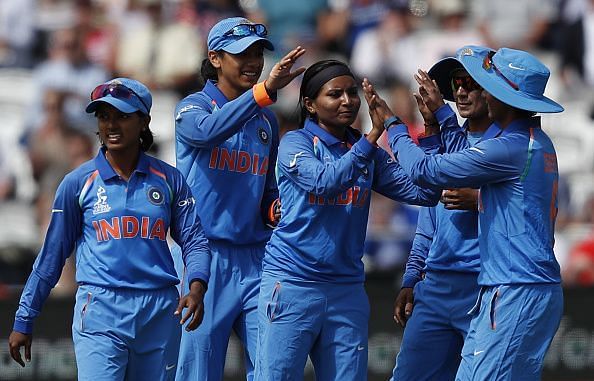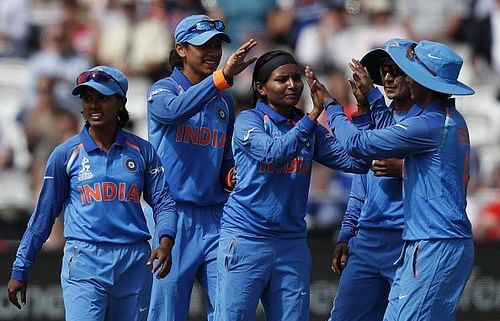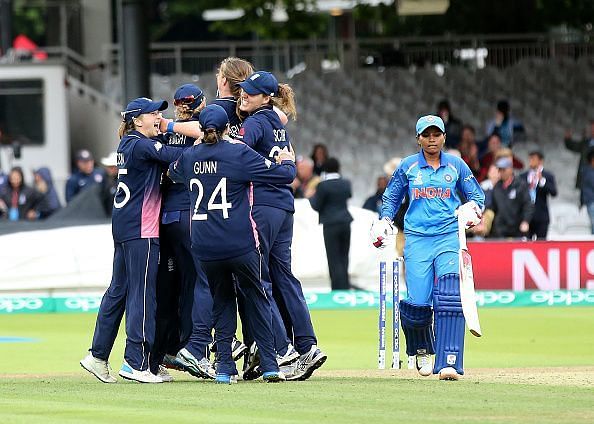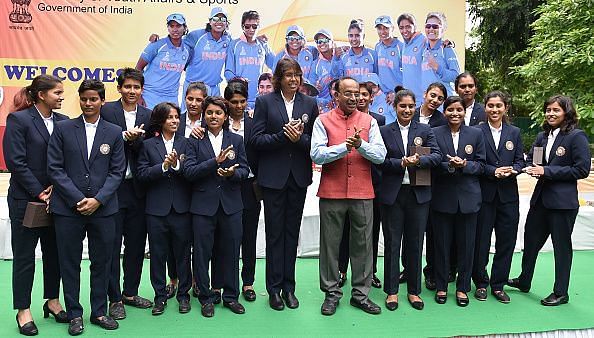
Everyone cried for two hours in the dressing room: Rajeshwari Gayakwad recalls World Cup heartbreak

Rajeshwari Gayakwad had politely declined a car worth INR 5 lakh offered by the government of Karnataka upon her return from the Women's World Cup 2017. She had asked, instead, for a roof over her head. She had been living in a rented apartment until then in the Vijayapura district of Karnataka and had no qualms in asking the government for shelter.
"Sir, it's very kind of you for having made the gesture. But I don't want a car; I want a house for my family, which includes mother, sister, and brothers. A shelter is we what we badly need now," she had said at the time.
She felt the need, and the authority, perhaps, to leverage a gift for a necessity. In the process, she laid bare the plight of not just athletes like her but tens of thousands of Indians who are struggling to make ends meet. Luxuries are just that; luxuries.
Having lost her father to a cardiac arrest in 2014, the 26-year-old has had a hard life - even as she was one of the 15 who, in her own words, and in Ian Bishop's, made India 'remember their names' for years to come. She has no complaints, though. She has made peace with whatever little she has been served.
"I have always been content with whatever has been available at my disposal. I have never felt that I needed anything more. Whatever I got, I used to my advantage and practised. When there were no coaches, I practised on my own. When there were no trainers, I trained on my own.
"But yes, to train well, you need the help of a professional. Although, quite frankly, I didn't really feel that I needed anything more at any point in time," she tells me three months after her team's historic World Cup campaign.
Gayakwad caught the attention of this writer after her head-turning 5/15 against New Zealand in a knockout clash in Derby that set-up India's semi-final date with the then defending world champions, Australia.
On September 16, almost two months on from the evening at Lord's, even as her teammates found themselves more on magazine covers than on the pitch -- a predicament in itself -- Gayakwad had her own moment of glory. She was invited by the Bijapur Bulls franchise of the Karnataka Premier League (KPL) to attend one of the team's league matches in Hubli.
"It was special. On every other occasion that I had been to a cricket stadium, I had gone as a spectator. To be invited as a guest was really special. It was the first time that I was invited to watch a game of cricket," she says, barely being able to hide her excitement.
The team didn't disappoint. However, it was bittersweet for Gayakwad. Bijapur's one-run win over the Bengaluru Blasters that evening was somewhat similar to how she'd played her last one-day international.
The final still hurts
Having walked in to bat with her team needing 11 off 11, Gayakwad and her tailender compatriot Poonam Yadav were all that was left of what once looked like an Indian behemoth ready to shatter England's dominance of women's cricket. When Jenny Gunn dropped Yadav off Anya Shrubsole, with India needing 10 off 9, Gayakwad would have been better off not having taken a single. As it turned out, the next ball ended the match.
"I was caught in a fix on the first ball -- I didn't know whether to attack or defend that delivery -- and lost my wicket in the process. That was our game to lose. That we lost it still pains us a lot," she remembers her first ball, which was also India's last in the World Cup.
A first-ball duck that handed over the cup to the opposition may have been written against her name, but to blame the No. 11 for India's loss would border on foolhardiness. The pressure on the untested lower order was enormous. From 191/3, India had slipped to 201/7, which soon became 218/9.
"There was a lot of pressure, especially after we had lost five wickets for 20-odd runs. The lower middle order was put under tremendous pressure. But we wanted to play until the end. That was the only thing on our minds. Unfortunately, that couldn't happen," she recalls.

That it couldn't happen would not have hurt as much as the manner in which it happened (or could not happen). Harmanpreet Kaur shared a 95-run stand with Punam Raut for the third wicket, and Raut added 53 more for the fourth wicket with Veda Krishnamurthy. But the collapse that was triggered by the fall of the fourth wicket couldn't be kept in check, not the least against a fiery Shrubsole, who ended up with five wickets to her name.
As the English women cuddled in a hurdle and Gayakwad sank to her knees at the crease after being clean bowled, the Indian dugout bore a morose look. Pictures that now depict both the beauty and brutality of the sport show the seniormost bowler of the squad, Jhulan Goswami, resting her head on Deepti Sharma's shoulders, while Veda's left palm is seen caressing Smriti Mandhana's cheek.
But there was more that couldn't be captured on the camera. After the cameras were off, when the girls -- well, most of them still girls -- returned to the dressing room, nobody could keep their emotions in check.
"There was pin-drop silence in the dressing room. Everyone was sad. We had worked so hard to reach that final and everybody wanted to get their hands on the trophy. All of us were blaming ourselves, thinking that we could have done it. But it just didn't happen," Gayakwad tells me, her eyes still lost in the moment, her face still bearing disappointments from the day.
"Everybody was crying in the dressing room. For two hours when nobody spoke anything, our coach (Tushar Arothe) walked up to us and tried to talk us out of the disappointment. He told us that we played our best cricket in the tournament, and victory and defeat are parts of the sport we play," she adds.
But one person looked seemingly unperturbed by the result of the game, at least from whatever we could see, after the last wicket had fallen. Mithali Raj has always been her own stoic self while standing up for her team after each game. The final match was no different, which was also, by her own admission, her last World Cup game.
"This was the last World Cup for Mithali di and we can say, Jhulan di as well. They have played cricket for so many years and we badly wanted to win this tournament and give them a gift. But we couldn't.
"Mithali di was happy with the team's performance. She said that we'd played some really good cricket as a team and every player who was given a chance in the tournament did well," Gayakwad remembers her captain's consolatory words.
That game against New Zealand
Gayakwad was given her chance, albeit quite late in the tournament, in a pressure game against New Zealand. In a world tournament, with every game having an implication on your chances of playing the knockouts, an eliminator against New Zealand could have been a tough barrier to overcome for someone playing her first game.
"I always prepared myself for the next game, irrespective of whether I featured in the XI or not. I hadn't played any of the six games that the team had played coming into that match (against New Zealand). But I always told myself that if I played, I'll give it my best shot," she says about her preparations.
In response to India's 265/7, New Zealand were bowled out for a paltry 79. Rajeshwari was ably supported by Deepti Sharma, who picked up two wickets, and Jhulan, Poonam and Shikha Pandey, who picked up one wicket each.
"I knew that if I get a chance, it would be in a crucial game. We were practising in the nets accordingly. We had played New Zealand prior to the World Cup as well, so we knew a few of their batters. That helped us in the game.
"Everyone was determined to win that game at any cost and reach the semi-final. It was a knockout game so they wanted to win this game as much as we wanted to. After we won, the feeling that we had -- of reaching the semi-final -- cannot be put to words," she adds.
Of course, it was bound to be a surreal feeling. Especially after the battering at the hands of Australia in the previous game, who were to be repaid in equal measure, come the semi-final. Was the loss against Australia a motivating factor?
"We were really hurt after the loss to Australia in the previous game, and wanted to give it back to someone. We just wanted to play our best cricket and not worry about the results, because we knew that if we played good cricket, we would win the game. The batters did really well. The bowlers -- and it wasn't just me -- bowled well. That was why we could dismiss them so early," she explains.
They did give it back, and when they returned to India, the fans, in whatever capacity they could, gave it back to their newly-found heroes. Most of them, whose knowledge was limited to the upper echelons of the team -- in Mithali and Jhulan, to be precise -- googled and found out the names behind those faces who landed in Mumbai on the midnight of July 26.

"Before the World Cup, people knew that women played cricket and India had a women's team. Now, they know us on a first-name basis. They might have known Harman, Mithali di, Jhulan di and maybe Smriti, but not everyone in the team. When the talk was about women's cricket, only those four were named.
"But now things have changed. Each and every player gets recognition now. People ask me, 'Are you Rajeshwari?' They approach us and ask us for autographs and selfies. It gives me a lot of pressure. Not many knew that a women's team from the country was going to play in a World Cup. But after we returned, we were pleasantly surprised," she says, her face lit with instant happiness.
'Surprised' was perhaps her way of putting it nicely, for the response that the team got the moment it stepped foot in India was tremendous. I remember my cousin telling me that when the men's team had won the 2011 World Cup, the entire stretch of Marine Drive, right from the Wankhede Stadium to the team hotel only two kilometers away, was jammed by the fans. The women were greeted with similar scenes.
"When we were leaving for London, there was nobody to see us off. When we returned, the airport was packed. Some of us couldn't believe it. We said, 'What is this?' It had become difficult for us to leave the Mumbai airport. Such was the madness. Such was the support.
"Even when we were in the UK, there were people praying for our victory and performing 'puja' back at home. We didn't know any of this because we were busy playing cricket. When we came to know about it, we felt really good thinking that there are people who support us.
"It wasn't just Mumbai. People all over the country know us. When we landed in Delhi, people recognized us immediately. We didn't expect that we'll meet the Prime Minister," she remembers fondly.
Pressure due to recognition?
The World Cup is in the past now. The hullaballoo is over, the political agendas of chest-thumping ministers are over and the women, not very surprisingly, are yet to take the field. When they do, will there be an added Everest of pressure? Will the scrutinizing eyes and op-eds put the team under the scanner? Will it be too much for women who have played in empty stadiums for most parts of their careers?
"There is no pressure (due to the recognition). Yes, there will be expectations of us. People would expect us to do well. And we, as individuals, would want to do well as well," she shrugs off the pressure equation.
Over the past three months, I have had conversations with two members of the World Cup squad -- Veda and Rajeshwari -- and two former cricketers -- Mamatha Maben and Shanta Rangaswamy. All of them have unequivocally resonated the need for women to have more games. Rajeshwari's opinion is no different.
"I think we should be playing more matches.There should be more camps organized. Earlier, there used to be camps only two or three weeks before an international series. That shouldn't be the case anymore. We have been blessed with a very good team, a team that performed so well in the World Cup and even before that in the tri-nation series. We were also the Asian champions and the winners of the World Cup qualifiers," she says.
"It was only after the World Cup that we realized how important these games were before the big tournament. But I think more matches should be played at the domestic level so that when there's a big series or an ICC tournament, even those girls who haven't made it to the India team, and who barely manage to play four matches in a year, are prepared for selection.
"Those girls would not be required to wait for a year to play another set of four-five matches. Like there's the KPL for the men, there should be tournaments organized for women as well. More and more girls would get the opportunity," she echoes her captain Mithali's sentiments, who has already vouched for a women's IPL.
Before we began this conversation, Rajeshwari had asked me to finish it quickly. She had said she had an engagement. Notwithstanding that, we talked for a good 20 minutes, which is a significant bit of time for a cricketer in India.
Maybe the engagement wasn't too pressing. Maybe she could afford to sit in the hotel lobby and chat. Maybe these women still aren't the superstars their male counterparts are. But sooner, rather than later, they should be.